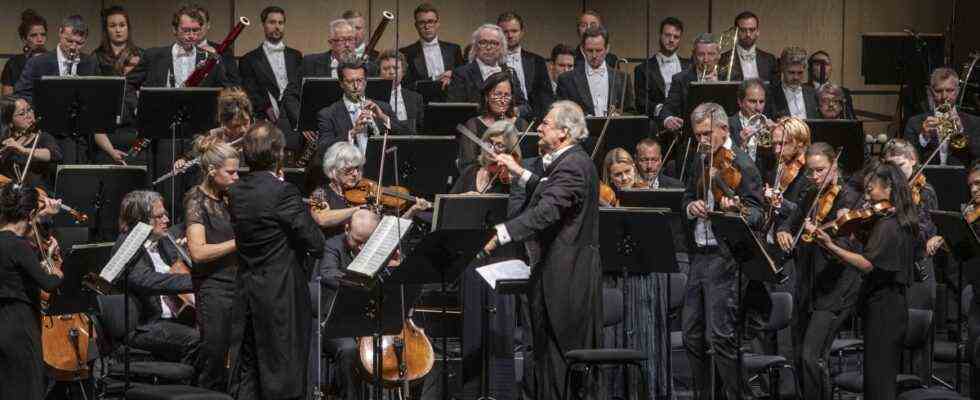When Max Reinhardt, the co-founder of the Salzburg Festival, filmed “Midsummer Night’s Dream” in 1935, he naturally had Felix Mendelssohn’s music edited for the soundtrack. Since its composition a hundred years earlier, the music with the famous wedding march had become inextricably linked with Shakespeare’s drama, so to speak it had become part of his own. In the meantime it has lost its place in theatrical productions because there are hardly any entire orchestras available and its formal specifications would probably only be perceived by contemporary directors as an obstacle on the way to self-realization. It has also not become at home in concert halls – with the exception of the overture – because it makes no sense as a mere sequence of numbers without the context.
In the Salzburg House for Mozart, the actors Mavie Hörbiger, Regina Fritsch and Roland Koch from the Vienna Burgtheater are now taking over the relevant excerpts from Shakespeare’s work. The encounter is particularly exciting in the melodramas, this hybrid form of spoken text and music cultivated especially by the Romantic era. The conductor John Eliot Gardiner dedicated two evenings at the festival to such border crossings between the performative and the concertante in works by Mendelssohn and Robert Schumann. Ultimately, Romanticism strove for a fusion and synthesis of several arts, which for both composers (also literarily highly educated) was not reflected centrally in the opera as a traditional total work of art, but in the search for completely new forms.
Robert Schumann turned “Manfred” by Lord Byron into a “dramatic poem with music”
“The whole thing would not have to be announced to the audience as an opera or a singspiel or melodrama, but as a ‘dramatic poem with music'”, wrote Schumann about his musical implementation of “Manfred”, the epoch-making three-act reading drama by Lord Byron. “It would be something completely new and unheard of.” The lines went to fellow composer Franz Liszt, who premiered the work at the Weimar Court Theater in 1852. In the meantime, one can be happy to hear the overture in the concert hall occasionally, while the extensive speaking scenes and the complete music are mainly known to experts.
The actor Jens Harzer as speaker in Robert Schumann’s “Manfred” after Lord Byron ..
(Photo: Marco Borrelli)
In Salzburg, the actor Jens Harzer proves to be the ideal cast for the torn, nervous, exalted title character who struggles for spiritual redemption and at the same time cannot accept it. However, the fact that the texts of the other characters have largely been shortened or that Harzer takes them over in a dialogue with himself does not necessarily make the story arc easier to understand. Under the comparatively good financial festival conditions, Gardiner could have had more courage here to really complete the work by involving additional actors.
In the end, the English conductor is primarily concerned with the music, the inherent theatrical power of which he makes audible from the perspective of historically informed performance practice. The fact that the strings of the Camerata Salzburg play almost without vibrato on both evenings ensures a fine-nerved, yet energetically charged sound. Gardiner brought the Monteverdi Choir, which he founded, with him, after which, fortunately, entire ensembles from Great Britain are now allowed to re-enter.
In Mendelssohn’s choir cantata “The First Walpurgis Night”, pagans outsmart Christians in order to be able to celebrate
The fabulous articulation of the choir ensures a high level of text intelligibility, its slim, agile sound drives away all the bourgeois indolence that often comes with choral music of the 19th century. He gives the “Requiem for Mignon” the floating mourning of an extraterrestrial ghost song with which Schumann set the funeral scene from Goethe’s novel “Wilhelm Meisters Lehrjahre” to music. It is not for nothing that Gardiner’s lesser-known works have always been particularly close to the heart, as the broken fracture of his music finds its ideal counterpart in the conductor’s subtle sense of form. At Gardiner, every phrase has a goal, even in small-scale structures, he ensures overarching tempo relations and precise transitions.
The – consistently outstanding – soloists emerge from the Monteverdi Choir instead of joining them from outside. This corresponds to the spirit of the choir culture of the 19th century, in which the citizen rediscovered himself as a singing collective. In his choir cantata “The First Walpurgis Night”, Felix Mendelssohn describes how the last remaining pagans in the time of Charlemagne outwitted the Christians in order to be able to celebrate the old, now forbidden Germanic gods. The fact that Christianity appears here as a religion of oppression is what makes the piquancy of the text – also by Goethe -: the heathen disguise themselves as witches and devils in order to frighten the superstitious Christians, which could also be easily implemented in a scenic way.
Gardiner puts a lot of effort into creating an exciting arc that definitely stimulates the theatrical imagination. In the dry pointed forte he whips up the sounds with which the Monteverdi Choir and the Camerata Salzburg kindle a true witches’ Sabbath. With their relational combination of rare works, both evenings fulfill the claim that the festival should have: a place of the special, to become impossible in the average concert business.

